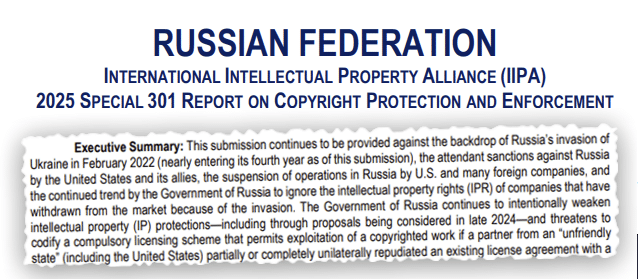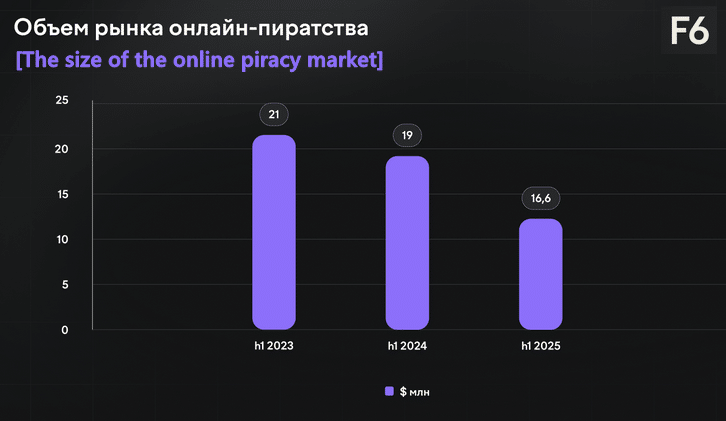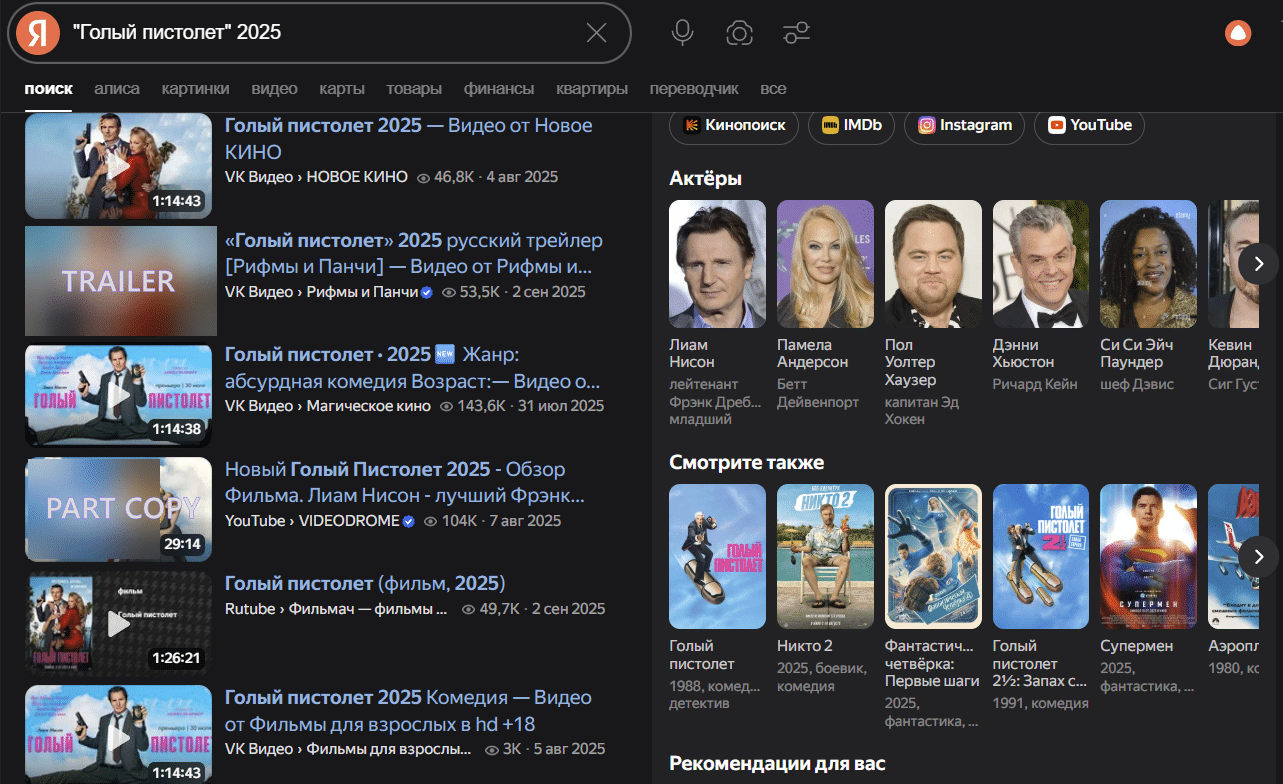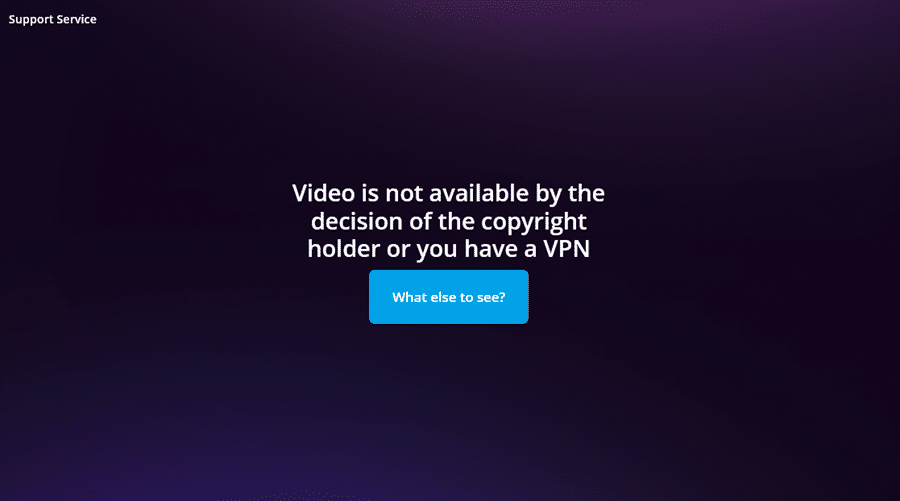 The sheer number of piracy studies conducted over the past three decades is a testament to the complexity and allure of the puzzle.
The sheer number of piracy studies conducted over the past three decades is a testament to the complexity and allure of the puzzle.
By any reasonable means available today, piracy has proven itself unsolvable. Yet there’s one inescapable constant that holds true across all products, in every single market.
If a product is unavailable to buy legally, piracy will create a market that didn’t previously exist and then become its only supplier. That’s the inevitable outcome when content owners refuse to compete, but when the same happens to an existing legitimate market under extreme circumstances, it certainly isn’t pretty.
Licensed Market Transformed into 100% Piracy
Following the invasion of Ukraine, Hollywood, Netflix and most Western movie and TV show companies pulled out of Russia, as the following excerpt from an IIPA report to the U.S. Government briefly explains.

Since the withdrawal from the market, regular movie releases enjoyed in the West have had no corresponding official release in Russia. Yet movies have been playing regularly both in cinemas and online, in breach of Russian law and in violation of the studios’ intellectual property rights.
In short, the content that fueled the largest share of Russia’s cinema sector was licensed one minute, and 100% pirated the next.
Study: Piracy Traffic and Profits Take a Hit
The findings of new study reported by Kommersant on Wednesday, suggest that making money from pirate sites isn’t as easy as it once was. That’s an interesting premise.
Since the most popular content in Russia is unavailable to view on legal platforms, at least in theory it has no competition either. Under these conditions piracy usually thrives but according to the study, it’s a bit of a struggle.
Cybersecurity company F6 (formerly known as Group-IB) claims that advertising revenue in the first half of 2025 fell by 14.5% when compared to the same period last year, and 26.5% when compared to 2023. The F6 chart below shows pirate site ad revenue in dollars, with total revenue expressed as the size of the market (translations by TF)

Kommersant’s report provides no further context, such as which sites or services generate the revenue. F6’s report doesn’t provide specific detail on that front either, but does offer two reasons why revenue is falling.
“Payments for displaying advertising are reduced. Last year, the cost of payments for advertising to visitors of pirated resources remained at about the same level, but in 2025 it began to decline again. In the first half of the year, the average CPM was $3.11 – 0.6% and 2.2% less than in the same period of 2024 and 2023, respectively,” F6 explain.
Search Query Traffic Down
The second factor is a reported reduction in search query traffic. In the first half of 2025, traffic was reportedly down 13.9% compared to the same period last year. We assume that most of the traffic usually originates from Yandex but again, details haven’t been made available so drawing an independent conclusion is much more difficult.
However, since site/URL blocking measures can indeed remove content from Yandex’s indexes, comments from F6 that pirated content is being detected more quickly, should in theory lead to faster blocking and deindexing. If that leads to lower quality search results, less search query traffic should be the end result. F6 reports that some pirates have even been using morse code to make their uploaded content harder to detect.

The prospect of Russian pirates routinely searching Yandex in morse code seems unlikely, but there seems to be more serious issues that aren’t directly addressed.
Hollywood Free-For-All?
Some time ago we were informed (unofficially) that blocking claims relating to Western movies weren’t being filed in Russia, therefore searches in local search engines have always returned useful results. Since nothing gets blocked, nothing is removed either, we were told.
Yet whatever the reasons, the bottom line right now is that Yandex and probably other search engines too, are awash with links to pirated Hollywood movies. Case in point, the recently released Naked Gun.

Beyond blocking and deindexing, the F6 study cites another reason for the decrease in traffic to pirate sites.
“This is due to the growing number of users of legal streaming platforms,” the company notes.
The study doesn’t name those legal platforms, mention their traffic volumes, or indicate how much their presence has helped in the bigger picture. But as their presence on Russia’s version of YouTube reveals, competition is fierce right now.
RuTube: The One-Stop-Shop For Everything
Launched in 2006 and ultimately owned by Gazprom-Media, RuTube is effectively Russia’s domestic version of YouTube but on a much smaller scale. Users upload content, just as they do on YouTube, and apparently some moderation takes place to ensure certain content doesn’t appear on the platform.

Beyond the obvious, the criteria aren’t clear but visit RuTube while using a VPN, and the site makes it clear that there are benefits when VPNs are turned off. Since under certain conditions VPNs are illegal in Russia, compliance is a matter of personal choice. As will become clear later on, choosing to keep a VPN on can have consequences.
User Uploads vs. Legal Streaming Service Channels
Heading into the film section on RuTube reveals many channels dedicated to the latest movies from the United States. In many cases direct links to movies available on RuTube can be found when searching Yandex. Russia’s piracy blocklist shows no sign of removals but even if that was the case, between 10 and 20 links on most titles is a clear sign of ineffective measures.

Whether any takedown notices have been sent for these or any similar titles is unknown, but there’s no question that they’re extremely popular. The table below shows the viewing figures for a single copy/upload of each movie, the viewing figures for all copies of the same title would obviously be much bigger.

The legal streaming sites in Russia (known locally as ‘Online Cinemas) no longer offer big Western movies of any kind, so those listed above are completely off limits. Most online cinemas do have channels on RuTube, however.

A visit to their respective channels doesn’t provide access to movies, those appear to be exclusively available on their own independent platforms. The content they provide there appears to be advertised on RuTube via trailers etc.
Yet even a loose comparison of the viewing figures shows that the legal services simply cannot compete with the unlicensed Hollywood movie uploads, not on RuTube for free or via their own subscription-based platforms.

No Good Outcomes
Returning to the F6 study, it cites a reported collapse of piracy on social media and hosting sites, from 12.1% of all piracy in 2024 to just 1.6% of the total in 2025. The remaining 98.4% is allocated to pirate sites of various kinds.
This could mean that RuTube isn’t considered a social media site and may not be viewed as a pirate site either. The latter makes more sense given the nature of the platform, but there’s still a risk that at least dozens of millions of pirate movie views aren’t being counted.
Two other possibilities paint a much darker picture: 1) RuTube is indeed covered by the 1.6% meaning that the overall piracy rate is unfathomably massive, or 2) Hollywood movies no longer have standing and as such, piracy is simply ignored or not counted. The only plus we’re aware of is that the content on RuTube isn’t as readily accessible as it first seems.
For those who haven’t yet tried to view something on RuTube using a VPN, the screenshot below shows a translated version of the puzzling message that appears.

It seems to imply that a copyright holder might allow its movies to be shown on RuTube, provided the viewer’s location can be properly identified, presumably inside Russia.
It might also be just another attempt to see the user’s real IP address but for what reason, is harder to say. Since all movies have to go through a vetting process to ensure they meet traditional Russian family values, that raises questions over the legal standing of every movie, pirated or not. We’re yet to hear of any arrests, but that doesn’t mean nothing ever happens.
Unavoidable Conclusions
The bottom line conclusions seem unavoidable. Aside from the death and destruction caused by the invasion, moviemakers cannot participate in their own market and therefore generate nothing from it. Having won the race to the bottom and ended up on a tube site, any revenue generated will be almost as low as it gets. Any perceived added value built up over the years is long gone, effectively eliminating any chance of a financial return for local cinemas and every one else in the same chain.
Not only are Online Cinemas unable to compete with piracy using international content in their own market, free pirate viewing across the board on RuTube is bound to have an inmact on consumption of domestic cinema too. If nothing else, time is at a premium and few people have time to watch several movies each week, let alone find time to go the cinema on top.
A scenario where almost everyone loses is rare, yet apparently not impossible.
From: TF, for the latest news on copyright battles, piracy and more.
Powered by WPeMatico
